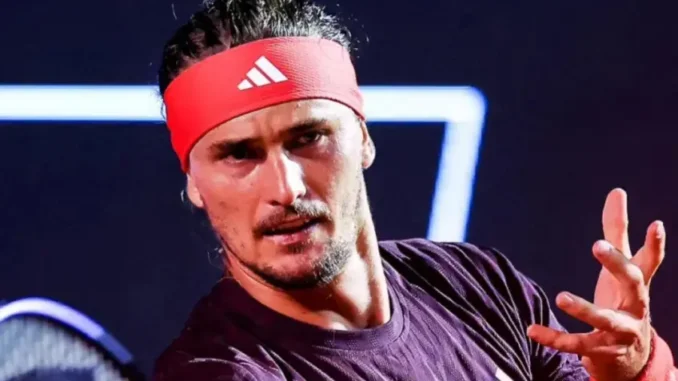
The intricate chess match that is professional tennis often reveals subtle weaknesses in even the most formidable players. Recently, Fabrice Santoro, a former tennis professional renowned for his tactical acumen, shared his insights into what he perceived as a key vulnerability in Alexander Zverev’s game. This analysis, stemming from Santoro’s keen observation and deep understanding of the sport, has ignited discussions within the tennis community, shedding light on the nuanced aspects of Zverev’s playing style and the strategic approaches employed by his opponents.
Santoro, known for his unorthodox style and ability to dissect his opponents’ games, has always been a keen observer of the sport’s intricacies. His assessment of Zverev’s weakness is not a mere critique but rather a nuanced observation that reflects his deep understanding of the game’s psychological and tactical dimensions.
“He sometimes struggles with maintaining a consistent level of aggression,” Santoro reportedly stated, offering his perspective on Zverev’s vulnerability. “When he’s playing at his best, he’s incredibly powerful and dominant. But there are moments when he allows his opponents to dictate the pace of the match.”
This observation highlights a key aspect of Zverev’s game: his tendency to fluctuate between periods of dominant aggression and moments of passive play. This inconsistency, according to Santoro, can be exploited by opponents who are able to capitalize on these lapses in intensity.
“It’s about controlling the rhythm of the match,” Santoro elaborated. “If you can disrupt his rhythm and force him to play on your terms, you have a chance to exploit his weaknesses.”
Santoro’s analysis suggests that Zverev’s vulnerability is not necessarily a technical flaw but rather a psychological tendency. The ability to maintain a consistent level of aggression and mental focus is crucial in professional tennis, and even the most talented players can struggle with this aspect of the game.
“It’s about mental resilience,” Santoro emphasized. “You have to be able to stay focused and maintain your intensity, even when things aren’t going your way.”
The former pro’s insights also shed light on the strategic approaches employed by Zverev’s opponents. By recognizing his tendency to fluctuate in aggression, they can develop game plans that aim to disrupt his rhythm and force him into uncomfortable positions.
“You have to be smart and strategic,” Santoro advised. “You have to understand your opponent’s weaknesses and find ways to exploit them.”
Santoro’s assessment also underscores the importance of adaptability in professional tennis. The ability to adjust one’s game plan and adapt to the changing dynamics of a match is crucial for success.
“You can’t rely on the same strategy every time,” Santoro explained. “You have to be able to adapt to your opponent’s strengths and weaknesses.”
The discussion also extends to the psychological aspect of Zverev’s game. The pressure to perform at the highest level can be immense, and even the most talented players can struggle with maintaining their composure under pressure.
“It’s not just about hitting the ball well,” Santoro observed. “It’s about managing your emotions and staying focused on the task at hand.”
Santoro’s analysis also highlights the importance of experience in professional tennis. Seasoned players, like Santoro himself, have a deep understanding of the game’s intricacies and the psychological aspects of competition.
“Experience is invaluable,” Santoro acknowledged. “It allows you to anticipate your opponent’s moves and make better decisions on the court.”
The former pro’s observations also extend to the evolution of Zverev’s game. As a young player, Zverev was known for his powerful serve and aggressive baseline game. However, as he has matured, he has also developed a more nuanced and strategic approach to the game.
“He’s a very talented player,” Santoro stated. “And he’s constantly evolving and improving his game.”
Santoro’s insights add to the ongoing conversation about Zverev’s potential and his ability to contend for major titles. While his talent is undeniable, his ability to address his perceived weaknesses will be crucial for his long-term success.
The discussion also highlights the importance of recognizing and addressing one’s weaknesses in professional sports. Even the most talented athletes have areas for improvement, and the ability to identify and address these weaknesses is crucial for achieving peak performance.
The understanding of a player’s weakness, as Santoro pointed out, is one of the most important aspects of a coach’s job. It is the coaches job to help the player understand and correct these weaknesses.
Leave a Reply